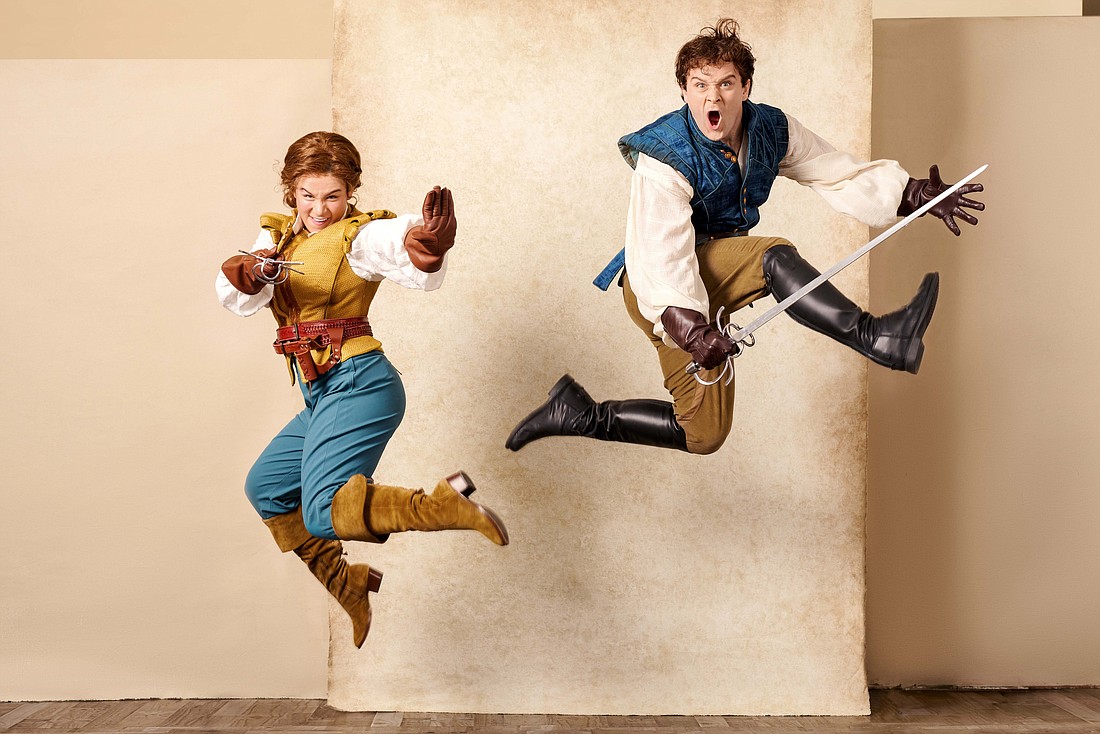- April 10, 2025
-
-
Loading

Loading

Back in 1844, Alexandre Dumas wrote a ripping yarn called “The Three Musketeers.” Not just a great story.
Like “The Odyssey” and “The Seven Samurai,” Dumas’ tale is amazingly elastic. The story is so strong, it survives adaptation, translation and appropriation into multiple forms. Speaking of which, it’s alive and well in Ken Ludwig’s farcical take in this Asolo Rep production.
The action unfolds in France in 1625. The foppish Louis XIII (Peter S. Raimondo’s) sits on the throne. The Musketeers of the Guard protect him. These elite warriors take their name from muskets. They know how to use these primitive firearms. But they’re far more deadly with old-school swords. Good thing. Cardinal Richelieu (Jay Russell) is the King’s enemy — and he’s got his own set of deadly warriors.
D’Artagnan (Evan Stevens), a clueless country kid, tries to join the Musketeers in their fight against the Cardinal’s sins. The unlucky lad gets on the bad side of three badass Musketeers — namely Athos (Leighton Samuels), Porthos (Dean Linnard) and Aramis (Ray Huth filling in for Rasell Holt). They initially want to kill him, but decide to train him instead. D’Artagnan’ sister Sabine (Erin O’Connor) joins the struggle. (She’s equally adept with cold, sharp steel.) The fight against evil begins! After that, things get complicated …
Stevens shows panache as the plucky young D’Artagnan. He wants to fight evil? Be careful what you wish for, kid. His sister, Sabine popped out of Ludwig’s imagination, not Dumas’ original novel. O’Connor brings her vividly to life on stage. Her Sabine loves her big brother. But she’s got a severe case of sibling rivalry. (Her bro’s swordplay was good. She got good, too.)
Samuels’ Athos is the three musketeer’s leader. He’s brave and smart, not flashy and boastful. His Athos has mastered the art of swordfighting. He doesn’t yap about his skill. He lets his rapier do the talking. Linnard’s Porthos is also a masterful swordsman. But he’ll crack jokes and clown around. His silly antics make foolish foes drop their guard. Big mistake. Huth’s Aramis is a darkly brooding romantic — a lover and a fighter. Raimondo’s King Louis XIII is a royal poseur. Queen Anne (Imani Lee Williams) is doing a royal job of cuckolding him.
Jay Russell’s Richelieu is a nasty piece of work. He’s good at being bad. Why? Because he likes it. Deadly Machiaevillian schemes are Richelieu’s bloody game of human chess — and his idea of fun. He’s been playing the game so long, he’s reached the master level. Lane’s unladylike Milady is every Walt Disney villainess rolled into one. She can smile and smile — then stab a knife in your back. That’s her idea of having fun.
That’s not the entire cast by a long shot. But it’s a fair sample of the talent.
The actors are all pretty, pretty good.
Adam Koch’s set is amazingly versatile. Depending on the scene, it’s a castle, a dungeon, a chapel, or a pub. (If one of the Transformers could turn into a stage set, he’d look like this.) Tracy Dorman’s costumes seem historically accurate, though the real ones were far less comfy. (Or clean.) James E Lawlor’s lighting and Matthew T. Parker’s sound add to this play’s storybook, fantasy vibe.
The story’s what it’s all about, after all. Ludwig is all about the story.
Dumas’ novel ran to 700 pages or so. The playwright squashed his sprawling tale down to two, high velocity acts. He added plenty of his own gags, pratfalls, and one-liners. But he packed in the best bits of the original novel, too. Ludwig honors Dumas’ gripping tale, and never waters it down. But he always keeps you laughing.
The playwright has it both ways, really. But it’s been done before.
Ludwig’s stage adaptation of “The Three Musketeers” is a close cousin to Richard Lester’s film adaptation. Both are fast and farcically funny. But Ludwig (just like Lester) never lets you forget the dangers or what’s at stake.
Ludwig’s comedy doesn’t crush Dumas’ tough, elastic story. His adaptation of “The Three Musketeers” is still a rousing yarn. Like many classic martial arts movies, it’s also the tale of a young warrior’s education in the fighting arts. On top of that, it’s a love story, an adventure, and a gripping struggle of good against evil. Above all, it’s a celebration of solidarity. “All for one and one for all,” isn’t the fashion lately. Here’s hoping it’ll come back in style. Sounds crazy, I know.
It’s so crazy it just might work.